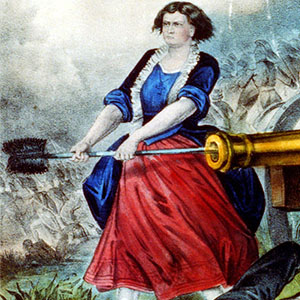Molly Pitcher was a heroine of the American Revolutionary War. While historians still debate whether Molly Pitcher was a real person known as Mary Ludwig Hays or a legendary figure that reflects numerous personas, her contributions to the war effort are uncontested.
Early Life
Mary Ludwig was born on October 13, 1744, near Trenton, New Jersey. Born to German parents, Mary grew up on a small farm, where she learned to work hard. At the age of 13, Mary went to work as a housekeeper for a Pennsylvania couple. She went on to meet her future husband while working for the Irvine’s. Mary married John Casper Hays on July 24, 1769.
Revolutionary War
Mary first entered the Revolutionary War on June 28, 1778, when her husband enlisted to serve with Capt. Francis Proctor’s company in the Pennsylvania Artillery. In those times, it was not uncommon for wives to accompany their husbands, and they often helped by cooking meals, washing clothes, and tending to the wounded soldiers.
Mary distinguished herself during the Battle of Monmouth. As the battle raged in the hot summer sun, Mary delivered buckets of water to the soldiers on the front lines. When her husband collapsed from heat stroke, she took over his cannon, and assisted in loading and firing the cannon until the Revolutionary soldiers declared victory. In recognition for her efforts, Mary earned a sergeant’s commission
Joseph Plumb Martin, a soldier from Connecticut, described Mary’s actions in his war memoir:
A woman whose husband belonged to the artillery and who was then attached to a piece in the engagement, attended with her husband at the piece the whole time. While in the act of reaching a cartridge and having one of her feet as far before the other as she could step, a cannon shot from the enemy passed directly between her legs without doing any other damage than carrying away all the lower part of her petticoat. Looking at it with apparent unconcern, she observed that it was lucky it did not pass a little higher, for in that case it might have carried away something else, and continued her occupation.
Later Life
After the war, John Hays received 200 acres of bounty land in Westmoreland County, Pennsylvania, for his service. Mary lived there with her husband until he died in 1789. She later married George McCauley. On February 21, 1822, the Pennsylvania State Legislature awarded Mary an annual pension of $40 for her heroism during the Battle of Monmouth. She died on January 22, 1833.
During the centennial of the Revolution in 1876, the citizens of Cumberland County marked Mary’s grave as an honored soldier. Today, battlefield monuments at Monmouth and at her gravesite commemorate “Molly Pitcher” and her role in the War for Independence.








